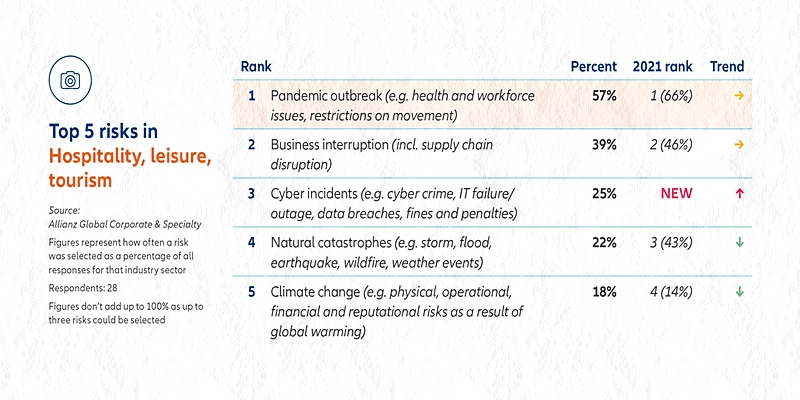Pandemic Outbreak Tops Hospitality, Leisure and Tourism Industry Risks

- 11th Allianz survey: Pandemic outbreak, business interruption and cyber incidents are the top three business risks in the hospitality, leisure and tourism industry.
- Natural catastrophes and climate change rank fourth and fifth positions respectively.
- Initiating or improving business continuity management is the main action companies are
Pandemic outbreak is the biggest concern for companies in the hospitality, leisure and tourism industry, according to the Allianz Risk Barometer 2022. This risk receives the top ranking after Covid-19 led to large-scale business closures and supply chain disruption globally and brought tourism and aviation industries to an abrupt halt. However, while the pandemic continues to overshadow the economic outlook in this industry, encouragingly, businesses do feel they have adapted well.
“When asked how prepared their company is for a future event, the majority (80%) of Allianz Risk Barometer respondents believe they are ‘adequately’ or ‘well prepared’, although only 9% feel ‘very well prepared’. However, just 11% feel ‘inadequately prepared’. Initiating or improving business continuity management is the main action companies are taking to make them more resilient,” says Thusang Mahlangu, Chief Executive Officer at Allianz Global Corporate & Specialty (AGCS) South Africa.
The Allianz Risk Barometer is an annual survey from AGCS which incorporates the views of 2,650 experts in 89 countries and territories, including CEOs, risk managers, brokers and insurance experts, on the top risks facing their company or industry sector. For the hospitality, leisure and tourism sector, 57% of respondents ranked pandemic outbreak as the top risk, followed by business interruption (BI) (39%) and cyber (25%). Natural catastrophes (22%) and climate change (18%) closes out the top five risks in the sector in fourth and fifth positions respectively. View the full industry sector, global and country risk rankings. Watch the video.
Impact of the pandemic on the African economy
According to the World Travel and Tourism Council (WTTC), in 2019 the travel and tourism industry accounted for about seven percent of Africa’s GDP and contributed $169 billion to its economy and employed more than 24 million people. However, in July 2020, the African Union estimated that Africa lost nearly $55 billion in travel and tourism revenues and two million jobs in only the first three months of the pandemic. According to the UN’s World Tourism Organization survey most people said they did not expect to return to pre-pandemic levels before 2023 at best. 41% of respondents said they expect the return to normal only in 2024 or later.
Business interruption ranks as the second most concerning risk in the industry. According to the survey, the most feared cause of BI is cyber incidents, demonstrating the impact of companies’ growing reliance on digitalization and the shift to remote working. Natural catastrophes and pandemic are the two other important triggers for BI in the view of respondents, also reflecting the fact that many of the top risks and consequences for the industry are interlinked
Ransomware drives cyber concerns while awareness of BI vulnerabilities grows
Cyber incidents is a new entry into the top five risks for hospitality, leisure and tourism companies in third position The main driver is the recent surge in ransomware attacks. Recent attacks have shown worrying trends such as ‘double extortion’ tactics combining the encryption of systems with data breaches. In addition, there is also a trend for supply chain incidents where hackers target technology or software supply chains, physical critical infrastructure or digital single points of failure; exploiting software vulnerabilities which potentially affect thousands of companies (for example, Log4J, Kaseya). Cyber security also ranks as companies’ major environmental, social and governance (ESG) concern with respondents acknowledging the need to build resilience and plan for future outages or face the growing consequences from regulators, investors and other stakeholders.
“Ransomware has become a big business for cyber criminals, who are refining their tactics, lowering the barriers to entry for as little as a $40 subscription and little technological knowledge. The commercialization of cyber crime makes it easier to exploit vulnerabilities on a massive scale,” explains Santho Mohapeloa, Senior Cyber Underwriter at AGCS.
Natural catastrophes ranks fourth as recent years have shown the frequency and severity of weather events are increasing due to global warming. For 2021, global insured catastrophe losses were well in excess of $100bn – the fourth highest year on record. Allianz Risk Barometer respondents are concerned about climate-change related weather events causing damage to corporate property (57%), followed by BI and supply chain impact (41%). However, they are also worried about managing the transition of their businesses to a low-carbon economy (36%), fulfilling complex regulation and reporting requirements and avoiding potential litigation risks for not adequately taking action to address climate change (34%).
“The pressure on businesses to act on climate change has increased noticeably over the past year, with a growing focus on net-zero contributions,” observes Thusang. “There is a clear trend for companies towards reducing greenhouse gas emissions in operations or exploring business opportunities for climate-friendly technologies and sustainable products. In the coming years, many corporate decision-makers will be looking even more closely at the impact of climate risks in their value chain and taking appropriate precautions. Many companies are building up dedicated competencies around climate risk mitigation, bringing together both risk management and sustainability experts.”
Businesses also have to become more weatherproof against extreme events such as flooding. “Previous once-in-a-century-events may well occur more frequently in future and also in regions which were considered ‘safe’ in the past. Both buildings and business continuity planning need to become more robust in response,” says Thusang.
Allianz Global Corporate & Specialty.
